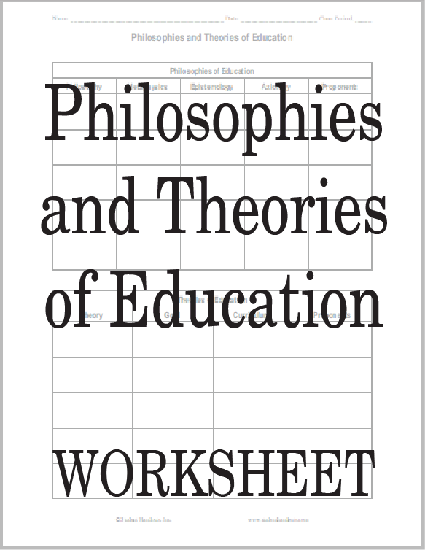Philosophies and Theories of Education |
| www.studenthandouts.com > Social Studies > Social Studies Handouts |
 |
 |
|---|
Philosophies
and Theories of Education: Table Graphs for Completion [Useful for teachers studying for
tests such as the Praxis (TM), or for use in teacher education
courses.] Click here to print this worksheet. |
|
Several leading philosophies and theories of education have shaped the field of education over time. These philosophies reflect different perspectives on the purpose of education and how it should be delivered. Some of the prominent philosophies and theories of education include:
Perennialism: This philosophy emphasizes the importance of teaching timeless and universal subjects, such as classical literature, mathematics, and philosophy. Perennialists believe that a strong foundation in these subjects provides students with essential knowledge and fosters critical thinking skills. Essentialism: Essentialism is similar to perennialism but focuses on a core set of essential subjects that all students should learn. It emphasizes a structured curriculum and a teacher-centered approach to education. Progressivism: Progressivism, associated with educational reformer John Dewey, emphasizes learning through real-life experiences and problem-solving. It advocates for active student engagement, hands-on learning, and a focus on students' interests and needs. Constructivism: Constructivism is based on the idea that students actively construct their own knowledge through interaction with their environment. It encourages student-centered learning, collaboration, and critical thinking. Behaviorism: Behaviorism, rooted in psychology, focuses on observable behaviors and the use of rewards and punishments to shape behavior. While it has been influential in education, it is less prominent today. Humanism: Humanism emphasizes the holistic development of individuals, focusing on their intellectual, emotional, and moral growth. It promotes education that nurtures the whole person and values human potential. Social Reconstructionism: Social reconstructionism views education as a means to address societal injustices and promote social change. It encourages critical thinking about societal issues and emphasizes social responsibility. Existentialism: Existentialism in education focuses on individuality, freedom, and the search for meaning. It encourages students to explore their unique identities and make choices in a world without predetermined values. Cultural Relevant Pedagogy: Developed by Gloria Ladson-Billings, this theory emphasizes the importance of recognizing and incorporating students' cultural backgrounds and experiences into the curriculum to make education more relevant and engaging. Feminist Pedagogy: This philosophy advocates for addressing gender inequalities in education and creating learning environments that challenge traditional gender roles and stereotypes. Multiple Intelligences: Developed by Howard Gardner, this theory suggests that intelligence is not a single, fixed trait but consists of various types of intelligence, such as linguistic, mathematical, spatial, and interpersonal. It promotes differentiated instruction based on students' individual strengths. Connectivism: In the digital age, connectivism emphasizes the importance of networks and digital technologies in learning. It focuses on the ability to navigate and access information as a critical skill. Inclusive Education: Inclusive education theory promotes the idea that all students, including those with disabilities or diverse needs, should receive education in mainstream classrooms. It emphasizes creating inclusive and supportive learning environments. Critical Pedagogy: Critical pedagogy, associated with Paulo Freire, focuses on addressing power imbalances in education and society. It encourages students to critically analyze and challenge oppressive structures and systems. Ecological Systems Theory: Developed by Urie Bronfenbrenner, this theory considers the ecological context in which learning occurs, including the influence of family, community, and culture on a child's development. These philosophies and theories of education often influence teaching methods, curriculum design, and educational policies. Educators may draw from multiple philosophies and theories to create effective and diverse learning experiences for their students. |
| www.studenthandouts.com > Social Studies > Social Studies Handouts |









